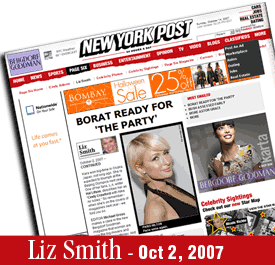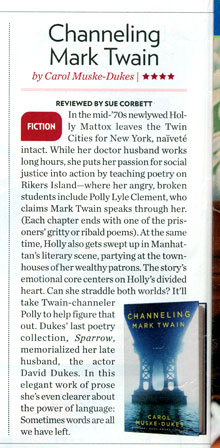|
A teacher of poetry sets up a literary workshop at the Women's House of Detention on Rikers Island, only minutes from Manhattan. This story has the lure, the exotic pain and problems of all stories told from inside a prison. Carol, widow of the fine actor David Dukes, is a National Book Award finalist and has created a commanding work of fiction here, based on all-too-real life. What she seems to be asking is, "Does art really matter to the downtrodden and the despairing?"
PEOPLE MAGAZINE July 16th, 2007
RANDOM HOUSE; 288 PAGES; $24.95 All authors, to some extent, write based on life experience. Some novels, however, stand out as significantly more autobiographical than others. That is not always a good thing, given the wealth of writers overconfident about the importance to others of their crises, or at least underskilled in expressing them. But some true works of art have come out of lives well observed, and there is no question that Carol Muske-Dukes' "Channeling Mark Twain" is one of them. Muske-Dukes is a prize-winning poet and a professor of English and creative writing at the University of Southern California. In 1973, she founded a poetry workshop and creative writing program at the Women's House of Detention at Rikers Island prison in New York. Muske-Dukes describes this experience as the catalyst for the novel. And while the narrator and her travails are rooted in what actually happened, Muske-Dukes uses her poet's gifts to turn real life into powerful and exploratory metaphor. Her narrator, Holly Mattox, is a young poet and volunteer bail poster who begins offering poetry workshops for female prisoners at Rikers Island. Holly's motley class includes fragile Darlene Denisky, horribly scarred Sallie Keller, Black Freedom Front leader Akilah Malik and Polly Lyle Clement, an epileptic who claims to be channeling her ancestor Mark Twain. As annoyingly quirky as this assortment might sound, the women's banter is touchingly realistic, often funny. And despite the cursory initial physical descriptions -- you may have to keep turning back to the introductory section on the class in order to keep track of the characters at first -- each class member does get fully fleshed out. The novel's impetus comes from Holly's discomfort as a young, talented and beautiful but socially conscious woman. She attends literary dinners, but cringes when her poet friends laugh at the prisoners' poems. She attends Marxist gatherings, but pointedly notices how uncomfortable her fellow protesters are when confronted with the idea of actually meeting the women whose bail they post. The novel is brutally but beautifully honest. Even Holly doesn't emerge fully in the right. She causes trouble in the prison and then realizes the value of maintaining a certain amount of order. It takes a lot of talent to make readers sympathetic to the problems of a narrator of Holly's qualifications, but Muske-Dukes makes her extraordinarily credible in her complicated vulnerability and concern. The novel draws out the parallels in women's experience across class and race, while not discrediting insurmountable differences. Holly certainly realizes that her problems are small potatoes compared with her students', but she also chafes against her just satisfactory marriage and hopes to never become her mother, disappointed by a life unachieved. Muske-Dukes lets the parallels between Holly's mother's imprisonment in a child-filled marriage and the prisoners' physical entrapment by the law go unspoken, but observed. Her women are stuck in a chronic battle between wanting to be loved and wanting to be free. Importantly, though, she trusts in a reader's ability to figure these and other things out independently, and this makes for great and readable rewards. Despite the novel's rooted realism, everything in it means something other than just itself. This is elaborately appropriate, given the choice of narrator and her development as a young poet. Polly's claims that she channels Twain are inexplicitly compared with the narrator's attempts at rendering the women's voices, or on even one level further up, Muske-Dukes' portrayal of all the characters. The novel is punctuated by sometimes moving, sometimes funny poems written by the women in the class, and it's unclear whether Muske-Dukes is again "channeling" or has actually composed these poems from scratch. At the heart of the book, beyond narrative concerns or class or race issues, is a heated and stunning ode to the poetic process and its necessity. The novel is riddled with repeating images: shawls for comfort, rafts for being alone. Holly is conflicted about the utility of poetry in the face of her husband's practical job as a doctor, but she never doubts its beauty or how essential it is to her. Part of the reason the novel's metaphors work is that Holly, and by extension, Muske-Dukes, is a literarily brilliant woman who would convincingly see the world in such poetic patterns. Hers is a life made more lovely for being interjected with verse, from her mother's quotations to her own internal meanderings. There is no simplistic conclusion about what the poetry does for the prisoners -- Holly admits that foremost, one needs physical essentials to survive -- but it is clear it does something for them, and just as much for us. "Channeling Mark Twain" is an unerring celebration of the power and utility of the poetic in our complicated world. It is also an extraordinarily empathetic portrait of the artist as a young woman. Like the greatest fiction, it provides a window onto a world most people would never dare cross into. Muske-Dukes takes vast chances with both her voice and her subject matter, and ends up with a work strongly based on reality, but unquestionably elevated into the wondrous realm of art. Margot Kaminski is a Palo Alto writer.
An elegant piece featuring a psychic descendant of Mark Twain. Muske-Dukes draws on her own experience with the penal system (she founded a creative writing program—the very first for prisoners—on Riker’s Island) to fashion a novel rich in both ideas and prose. Holly Mattox is a young Midwesterner in New York, secretly married to K.B. (marriage seems so embarrassingly establishment in the early ’70s), and trying to prove herself as a poet, a teacher and a thoroughly independent woman. She has a mentor of sorts in Sam Glass, a young editor with connections to all that’s literary in the city (the identity of real writers are thinly, amusingly veiled) and quite a bit beyond. He invites her to important events, tries seducing her and gets her a job lecturing smug grad students at Columbia. But that world is a far cry from her volunteer work—teaching a poetry workshop at the Women’s House of Detention on Riker’s Island. Most of the women are in for prostitution, but a few are there on murder charges, including Akilah Malik, a notorious radical charged with killing a cop. And then there’s Polly Lyle Clement, seemingly charged with nothing more than mistakenly landing her raft on the island. They all produce fairly heartbreaking poetry — what you would expect from the defeated lives they describe, except for Polly, who claims to be the descendant of Mark Twain and is channeling his spirit in class. Polly indeed has a way with words and half convinces everyone that something vaguely supernatural is going on, as she seems to see the “truth” of everyone’s crimes. Holly becomes emotionally involved with the women, and when Akilah breaks out of prison, it becomes Holly’s mission to save Polly, now slowly dying in solitary, and suspected of arranging Akilah’s escape. Though well-plotted, Muske-Dukes triumph lies in building a discourse on the nature of language, of poetry, of its small successes and inevitable limitations in the midst of ruinous lives. Lovely, original writing on the unlikely romance between prisoners and poetry.
Channeling Mark Twain Channeling Mark Twain Occupying a seat on a Riker's Island-bound bus crowded with menacing, diamond-studded pimps is just another day in the life of Holly Mattox, the self-consciously attractive newlywed protagonist of Muske-Dukes's fourth novel. Set in 1970s New York City, the novel follows Holly as she becomes increasingly, and perhaps dangerously, involved with the female inmates who attend her jailhouse poetry workshops. Undeterred by the catty disapproval of her literary contemporaries, Holly forges on, leading a class of bickering inmates, including mentally disturbed Billie Dee, transgendered Gene/Jean, God-fearing Darlene and fragile, heavily sedated Polly Lyle Clement, who claims to be the great-granddaughter of Mark Twain. (Twain also, Polly claims, speaks through her.) An affair with fellow scribe Sam Glass threatens Holly's young marriage as Polly gets thrown into solitary for her possible involvement in another inmate's jailbreak. The jail administration wants Holly to extract information from a delusional Polly, but Polly could be crumbling too fast for Holly to save her. Prisoners' poems appear throughout and afford a sometimes hilarious, sometimes stark look beneath the inmates' grizzled exteriors. Fiction with a political conscience often sacrifices craft in favor of driving home a message, but Muske-Dukes pulls it off.
Booklist — Donna Seaman
|
|||||||||||||||||||||||||||||||||||||||||||||||||
|
||||||||||||||||||||||||||||||||||||||||||||||||||
|
Home | Bio | Channeling Mark Twain | Publications | Fiction | Poetry | Articles | Interview | Reviews | Remembering | Events | Contact
|
||||||||||||||||||||||||||||||||||||||||||||||||||

 A WONDERFUL book by Carol Muske- Dukes is titled "Channeling Mark Twain." It has won raves, and since I reread it after seeing an excerpt, I can't get it out of my mind.
A WONDERFUL book by Carol Muske- Dukes is titled "Channeling Mark Twain." It has won raves, and since I reread it after seeing an excerpt, I can't get it out of my mind. 




